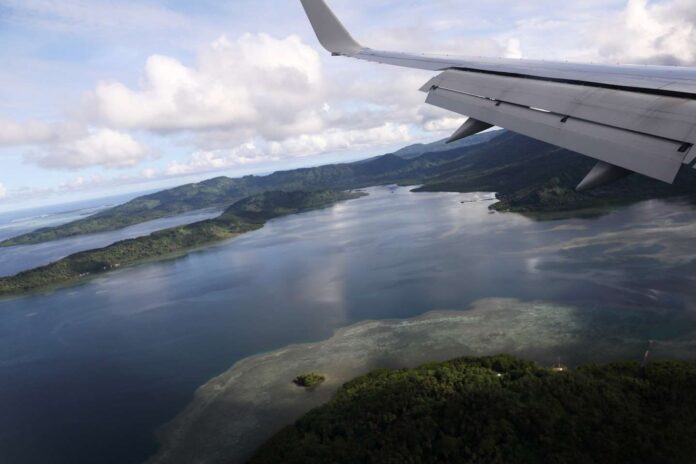
SYDNEY (Reuters) – Prominent U.S. lawmakers warned a Pacific ally that China risked undermining the security of a sensitive undersea cable project if a cut-price, state-backed bid wins a tender process overseen by development agencies, a letter reviewed by Reuters shows.
A Chinese foreign ministry spokesman on Wednesday rejected the accusation as lies.
In the letter dated Sept. 18, Republican senators Ted Cruz and Marco Rubio told the Federated States of Micronesia (FSM) that China could leverage its way into the project to wage “campaigns of espionage and geopolitical coercion”. Beijing recently imposed symbolic sanctions on both Cruz and Rubio.
Reuters reported last week that Huawei Marine, recently divested from Huawei Technologies Co Ltd and now majority-owned by another Chinese firm, submitted bids priced at more than 20% lower than two rivals for the $72.6 million project funded by the World Bank and the Asian Development Bank (ADB).
Washington has pressed governments around the world to squeeze Huawei Technologies Co Ltd out of supplying critical infrastructure, alleging the company would hand over data to the Chinese government for spying, a charge consistently denied by the company.
The cable project is designed to improve communications to the remote Pacific island nations of Micronesia, Nauru and Kiribati, although it has reached an impasse at the bid assessment stage, two sources with direct knowledge of the project details told Reuters. All parties involved have input on the selection of the tender winner.
The people with knowledge of the situation declined to be identified because of the sensitivity of the project.
Following Reuters’ report last week, Chinese foreign ministry spokesman Wang Wenbin said that the United States was smearing Chinese companies.
Another ministry spokesman, Zhao Lijian, told a news briefing in Beijing on Wednesday that Cruz and Rubio are people “without a shred of political credibility” and who have “seized any opportunity to oppose China and fabricate lies so as to score political points by smearing China.”
Zhao also cited unidentified Danish news reports that allege the United States spied on the Danish government by tapping on data from fibre optics cables passing through Denmark.
“The world sees through clearly the U.S. tricks of smearing others while glorifying itself,” Zhao said.
Huawei Marine and its new majority owner, Shanghai-listed Hengtong Optic-Electric Co Ltd, did not respond to Reuters’ questions. Huawei Tech Investment Co retains a small stake in Huawei Marine, company filings show. (Graphic: MAP: Submarine cables in the Pacific, https://graphics.reuters.com/CHINA-PACIFIC/dgkvlqbmmpb/SUBMARINE-CABLES.jpg)
The interjection by Cruz and Rubio builds on earlier communiques sent to Pacific nations by U.S. embassies warning against awarding Huawei Marine the contract.
Signed by Cruz and Rubio, the letter said that awarding Huawei Marine the contract would “deeply complicate relations between our countries and hinder the ability of U.S. diplomats and personnel to interact with your government.”
“The Chinese Communist Party subsidizes companies such as Huawei to ensure they are able to undercut all competitors, and then uses infrastructure installed by those companies to advance the CCP’s campaigns of espionage and geopolitical coercion,” the letter said, referring to the Chinese Communist Party (CCP).
Cruz’s office did not respond to questions. Rubio’s office could not be immediately reached for comment outside business hours.
The U.S. State Department said in a statement to Reuters that Huawei and its current and former subsidiaries, including Huawei Marine, posed “economic and national security risks”.
Under the Compact of Free Association, a decades-old agreement between the United States and its former Pacific trust territories, Washington is responsible for Micronesia’s defence.
FSM said in a statement that the procurement process was a “complicated endeavour” involving the cooperation of the three Pacific nations and two development agencies.
The Nauru government, a Pacific ally to Taiwan, which is viewed by China as a wayward province, was the first to raise concerns about Huawei Marine’s bids, the two sources said.
The Nauru government said in a statement the bid process was confidential. The Kiribati government, which last year severed diplomatic ties with Taiwan in favour of China, did not respond to questions.
A World Bank spokesman said the tender for the “complex, multi-country project” was ongoing and could not provide specific comments on the process. The ADB referred questions to the World Bank.
The cable project, which offers far greater data capacity than satellites, is particularly sensitive because it is designed to connect to the HANTRU-1 undersea cable, which is primarily used by the U.S. government and lands at Guam, a U.S. territory with substantial military assets.
Rival bidder Alcatel Submarine Networks, part of Finland’s Nokia, said in a statement it was ready to start the project if selected. The third bidder, Japan’s NEC, did not provide information on its proposal.
(Reporting by Jonathan Barrett; additional reporting by Yew Lun Tian and the Beijing Bureau; Editing by Kenneth Maxwell)
